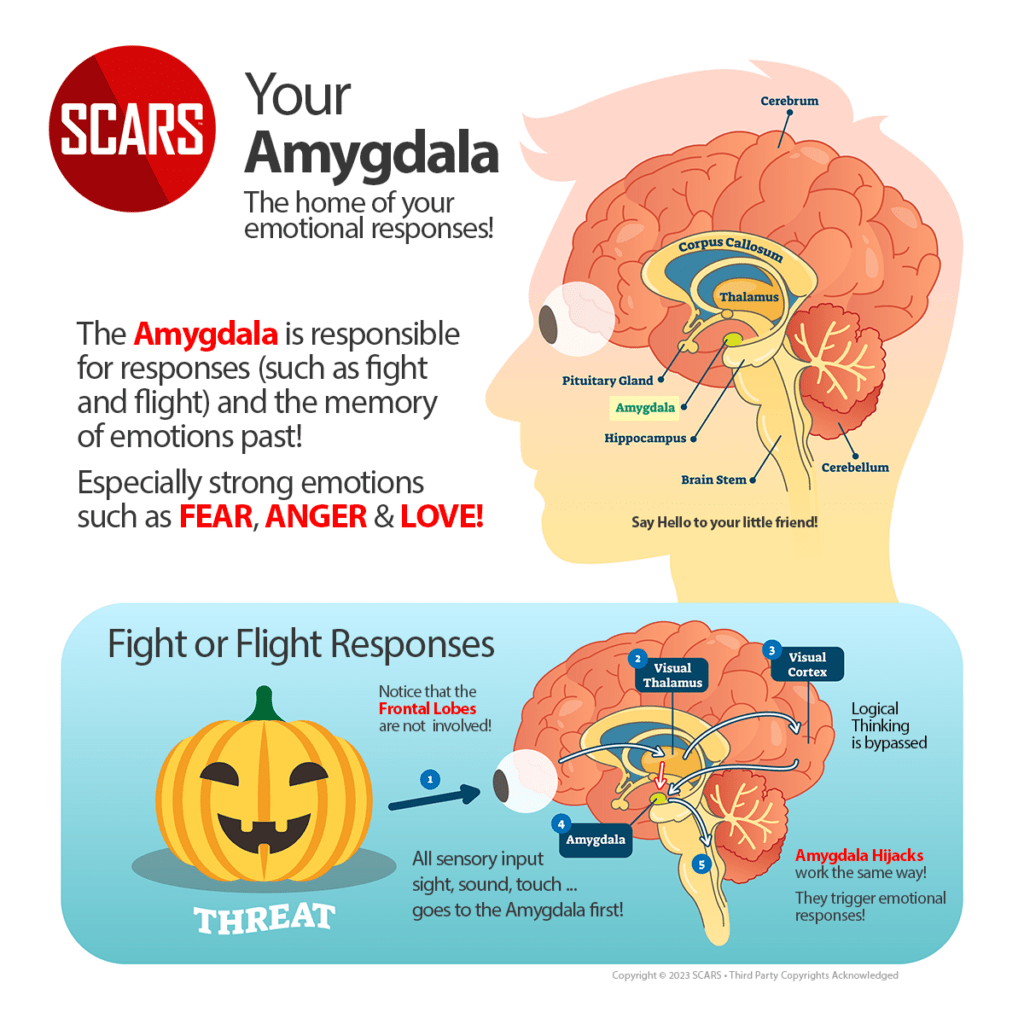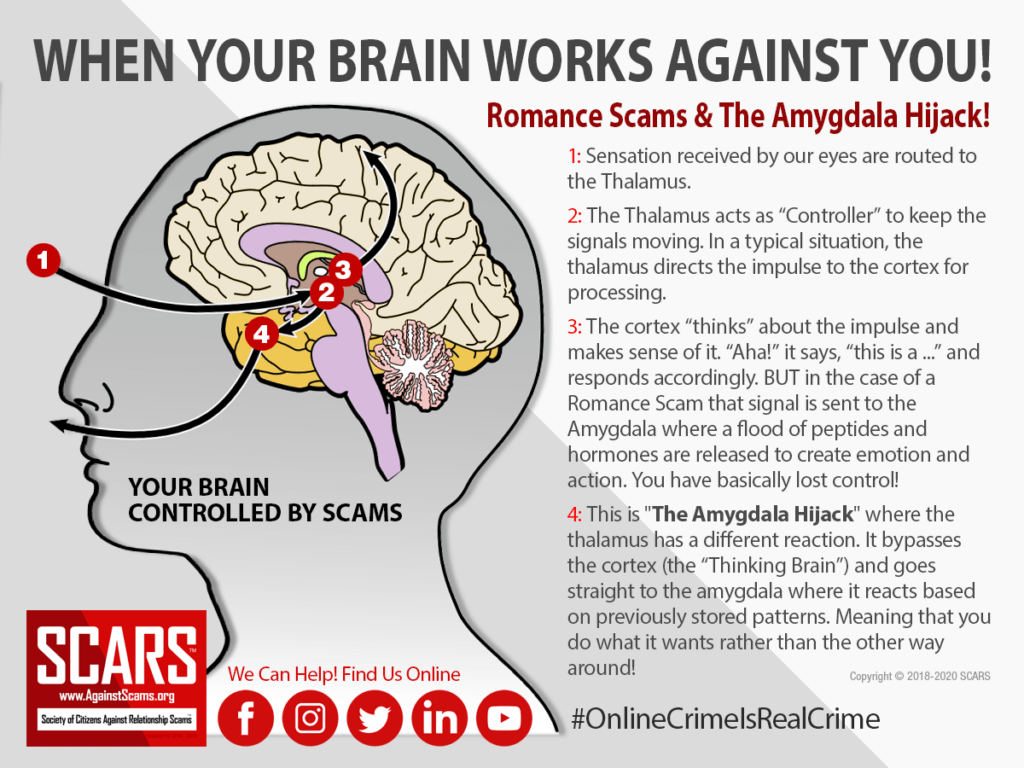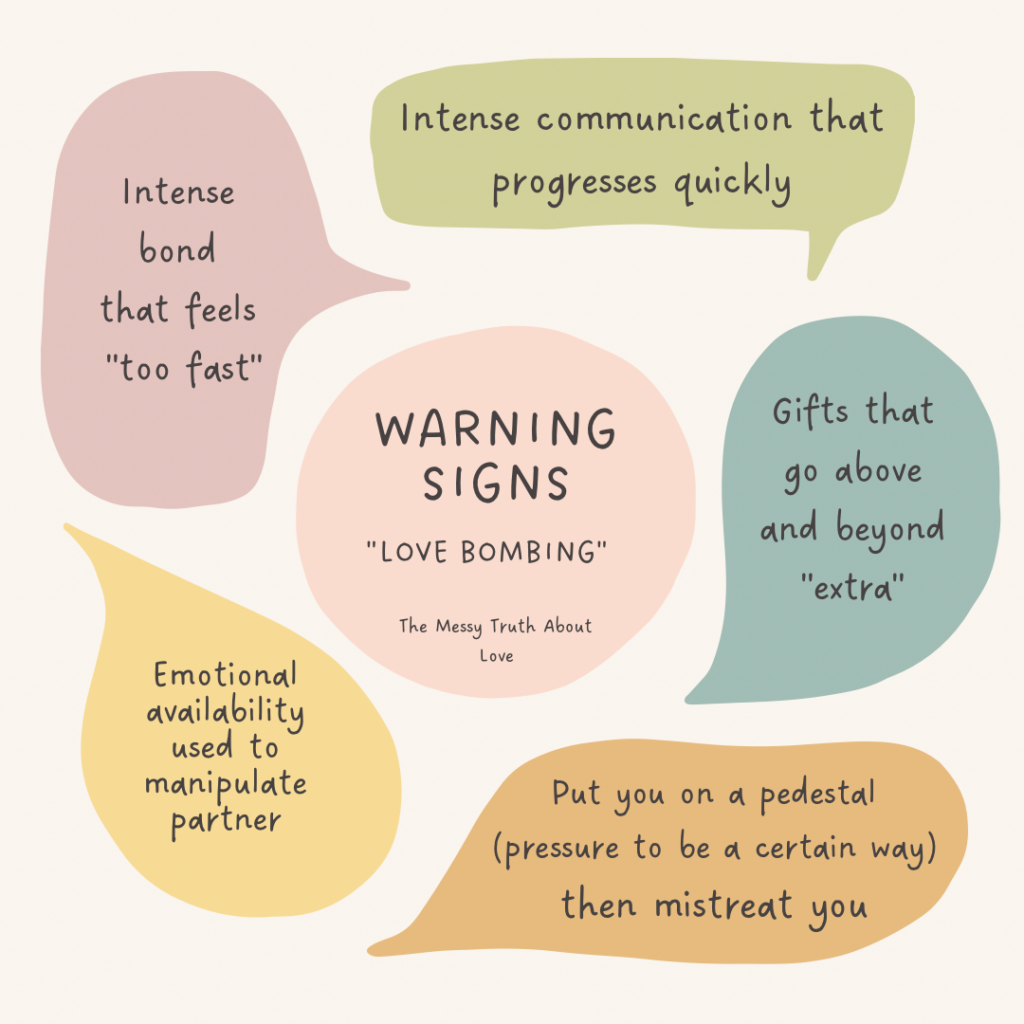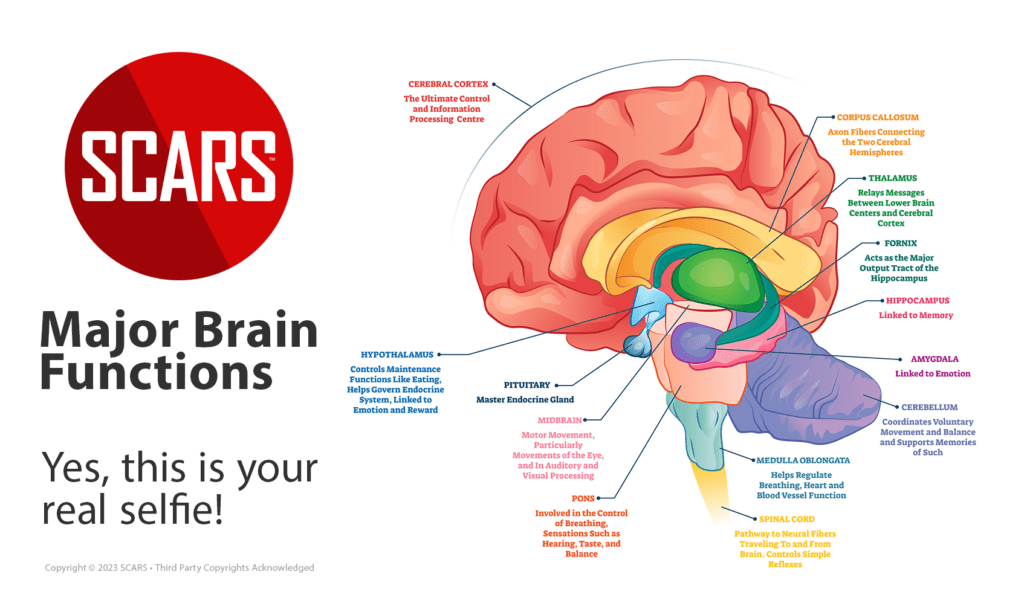Love Bombing & Amygdala Hijacked Scam Victims
Love Is Chemical After All
Scam Victim Recovery Psychology
Authors:
• Vianey Gonzalez B.Sc(Psych) – Licensed Psychologist Specialty in Crime Victim Trauma Therapy, Neuropsychologist, Certified Deception Professional, Psychology Advisory Panel & Director of the Society of Citizens Against Relationship Scams Inc.
• Tim McGuinness, Ph.D. – Anthropologist, Scientist, Director of the Society of Citizens Against Relationship Scams Inc.
Article Abstract
In the case of online deception, scam victims often find themselves deeply in love, only to realize it was a meticulously crafted illusion—a result of Amygdala Hijacks and Love Bombing caused by deceptive romance scams.
Love involves a complex interplay of hormones and neurotransmitters in the brain, creating a potent cocktail that scammers exploit. Amygdala Hijacks create urgency and fear, triggering the brain’s fight-or-flight response, while love bombing floods victims with excessive affection to foster attachment. The brain’s striatum and TPJ play pivotal roles in processing love, and scammers manipulate positive amygdala hijacks to create false trust and affection.
Understanding the brain’s role in romance scams empowers scam victims to recognize manipulation and understand why they are not to blame, fostering healthier authentic connections in the real world. Therapy proves instrumental in the recovery process, offering a safe space to process emotions and set boundaries.

“Love” Scammed: Understanding the Brain’s Amygdala Hijacked & Love Bombing That Creates The Romance in Online Deception & Scams
Romance scams don’t just steal money, they steal hearts thanks to something called an Amygdala Hijack. Scam Victims often recount feeling deeply in love, only to learn their “soulmate” was a carefully crafted illusion or fake.
But what’s happening in the brain that makes these scams so effective? The answer lies in the intricate complexity of hormones, neurotransmitters, and a vulnerable amygdala that can be easily hijacked.
Important
It is important to understand that Love Bombing and Amygdala Hijacks are not the same thing. Amygdala Hijacks are typically used to prepare and take control of emotions while Love Bombing begins and continues. Learn more about Amygdala Hijacks here: The Amygdala Hijack And Scam Victims [Infographic] – Expanded 2024 (romancescamsnow.com)
What is Love?
Love is a complex emotion that has fascinated humans for centuries. It is a feeling that can be both exhilarating and confusing, and it is often difficult to understand the mechanics behind it. However, recent research has shed light on the biological processes that occur in the brain when we experience love.
Falling in love triggers a wide range of hormonal changes. Dopamine, the “reward neurotransmitter,” surges, driving an intoxicating desire for connection and repetition. Oxytocin, the “cuddle hormone,” fosters bonding and trust, making us feel safe and secure. Next comes Serotonin, the “mood elevator,” that keeps us feeling giddy and content. This potent cocktail creates a rose-tinted reality, making us more susceptible to grooming, manipulation, and control.
Real Love is a Chemical Cocktail
Falling in love triggers multiple hormonal and neurochemical changes.
- Dopamine, the “reward neurotransmitter,” surges, driving a desire for connection and repetition.
- Oxytocin, the “cuddle hormone,” fosters bonding and trust.
- Serotonin, the “mood elevator,” keeps us feeling happy and content.
These chemicals create a potent brew of euphoria, making us see the world through the emotions triggered by these chemicals – pure and simple.
When we fall in love, our brains release a cocktail of hormones and neurotransmitters which are responsible for feelings of happiness, bonding, and well-being. The release of these chemicals is what makes love such a powerful and addictive emotion.
Not All Experiences of Love are Genuine
Scammers often use manipulative techniques to force emotions caused by hormones and neurotransmitters against their victims’ will. In other words, this is a violation, or as some victims have called it “psychological rape.”
One such technique is amygdala hijacking, which is an evolutionary response to any threat to our safety and security.
The amygdala is a small almond-shaped structure in the brain that is responsible for processing emotions such as fear, anger, and pleasure. When we experience a threat, the amygdala sends a signal to the hypothalamus, which activates the body’s fight-or-flight response. This response is designed to protect us from danger by releasing adrenaline and other stress hormones that prepare us to either fight or flee.
But, this is where it gets complicated, amygdala hijacking is technically different from love bombing.
Amygdala Hijacks & Love Bombing – Manipulating Emotions Against Your Will
The amygdala, a primal part of the brain responsible for emotions like fear and pleasure, plays a crucial role in this hormonal dysfunction.
Scammers use amygdala hijacking to create a sense of urgency and fear in their victims. They do this by creating a situation that triggers the amygdala’s fight-or-flight response, which causes the victim to act without thinking. For example, during the Australian Tax Office scam, the criminal convinces the victim that if they do not make immediate payment, they will be arrested and incarcerated. The fear response to this news causes amygdala hijack, which shuts down the pre-frontal cortex, our rational, logical ‘executive function’ part of our brain. This causes us to act and not think, leading to the victim making a payment without considering the consequences.
The critical part of an amygdala hijack is to evoke stored emotional responses and then produce and release hormones and neurotransmitters in the brain. This makes the amygdala hyperactivated.
Positive Amygdala Hijacks
The amygdala can be involved in positive emotional responses as well. The amygdala plays a crucial role in processing emotions, including both positive and negative ones. It is involved in the formation and storage of emotional memories, and its activation can contribute to the intensity of emotional experiences.
In the context of positive emotions, such as joy, love, or happiness, the amygdala may become activated to enhance the encoding and retention of those positive emotional memories. Positive experiences can lead to the release of neurotransmitters and hormones that contribute to feelings of reward and pleasure.
In the case of scams or manipulative tactics, scammers may exploit the amygdala’s role in processing positive emotions to create a sense of trust, affection, or attachment in their victims. They might use various techniques, including love bombing, to trigger positive emotional responses and strengthen the emotional connection between the scammer and the victim.
It’s important to note that the amygdala’s involvement in emotional processing is complex, and its activation is not inherently negative. The amygdala’s role is adaptive, helping individuals form emotional memories that guide behavior and decision-making. However, in the context of scams, manipulation involves exploiting these natural processes to deceive and manipulate victims emotionally, whether through positive or negative emotional experiences.
Love Bombing Technique
Love bombing often initiates with excessive flattery, premature declarations of love, and extravagant gestures. It’s essential to discern warning signs, as perpetrators aim to create dependency, control lives, and cultivate emotional reliance. Red flags include excessive time demands, encouraged dependency, and mistreatment of others.
When we connect with someone we feel affection for – after trust and affection have become established, the amygdala becomes less active, allowing positive emotions to flow freely.
This decreased amygdala activity makes us more susceptible to romantic manipulation, especially techniques like:
- Love Bombing: A targeted onslaught of affection and adoration that triggers rapid emotional attachment and oxytocin release, making it harder to think critically. Being showered with love and affection during the early stages of a relationship can be exciting and flattering. However, while such gestures are sometimes sincere, they can constitute emotional abuse and be harmful in various ways if the individual performing them does so in order to manipulate their partner. If you’re in the dating world, it can be helpful to familiarize yourself with the warning signs of love bombing so you can recognize it if it happens to you and defend yourself accordingly.
- Mirroring: Mimicking the victim’s mannerisms and interests, fostering a sense of deep connection and understanding.
- Social Isolation: This is called ‘gaslighting’ – encouraging the victim to cut off ties with friends and family, increasing dependence on the scammer and reducing support networks.
Real Love Bombing is not a form of amygdala hijack but is often confused for it.
These manipulative tactics exploit the vulnerability of the amygdala in an artificially love-struck brain. They bypass critical thinking and directly trigger the emotional reward system in the striatum and TPJ (and elsewhere,) creating a powerful sense of attachment and dependence. This “amygdala hijack” can make it feel like love is real, even when it’s a carefully constructed illusion.
This technique used by scammers is known as ‘love bombing’, which is a form of emotional manipulation that involves showering the victim with affection and attention. During the grooming stage, the criminal works on eliciting a high level of trust to manipulate the victim into what the criminal terms the ‘ether state’. This state is characterized by high oxytocin levels which are increased through ‘love bombing’; validating the victim, telling him or her how wonderful they are, sending love notes and love poems throughout the day, and relentlessly, emotionally bombarding them with ‘love vibes’. When the criminal has manipulated the victim into this state, they can start asking for money, often citing plausible (but at the same time, unusual) reasons, such as accidents, lost wallets or banking issues. The victim is encouraged to keep messaging through the night, leading to sleep deprivation, which also has a detrimental effect on cognitive function. The criminal will paint a vivid and highly potent picture of a future life together. Because the victim will want to believe everything the criminal says, they will employ selective thinking. The victim will filter out any observations that run contrary to their belief in their love interest’s story. This is why it is so difficult for well-meaning friends or family members to convince the victim they are falling for a scammer.
The potential effects of love bombing are profound, causing emotional turmoil and establishing a push-and-pull dynamic over time. Perpetrators may engage in such behavior due to deep-seated insecurities, seeking validation through grand gestures. Recovering from love bombing involves removing oneself from the harmful situation, regaining independence, and rebuilding self-esteem.
The Striatum & TPJ and Love!
The striatum and TPJ (temporoparietal junction) play important roles in the brain’s processing of love, affection, and attachment, each contributing to different aspects of these emotions.
A. Striatum:
-
- The striatum is a key component of the brain’s reward system. It is associated with the experience of pleasure and reinforcement of behavior.
- In the context of love, the striatum is activated when individuals experience rewarding stimuli, such as being with a loved one. This activation reinforces the desire to seek and maintain that connection.
- Dopamine, a neurotransmitter associated with pleasure and reward, is released in the striatum during positive social interactions, contributing to feelings of love and attachment.
The striatum and the nucleus accumbens are closely related structures in the brain, and the nucleus accumbens is a part of the striatum. Their definitions and distinctions:
- Striatum:
- The striatum is a subcortical part of the forebrain, located near the center of the brain.
- It consists of two main components: the caudate nucleus and the putamen. These structures are involved in various functions, including motor control, reward processing, and cognitive functions.
- The striatum plays a crucial role in the brain’s reward system and motor function.
- Nucleus Accumbens:
- The nucleus accumbens (NAcc) is a specific region within the ventral striatum. It is often considered a key component of the brain’s reward system.
- The nucleus accumbens is associated with the processing of reward, pleasure, reinforcement, and addiction. It plays a role in motivation and the experience of pleasure related to various stimuli, including social interactions and substances like drugs. It plays a major role in love bombing.
- Distinctions:
-
- The striatum is a broader term encompassing the entire structure, including the caudate nucleus and putamen.
- The nucleus accumbens is a specific region within the ventral striatum, emphasizing its role in reward processing and motivation.
The nucleus accumbens is a subregion within the larger striatum, and it specifically plays a central role in reward-related processes and motivation. The striatum, in its entirety, contributes to a range of functions beyond reward, including motor control and cognitive processes.
B. TPJ (Temporoparietal Junction):
- The TPJ is involved in various social cognitive functions, including perspective-taking, empathy, and understanding the intentions of others.
- In the context of love and affection, the TPJ may play a role in understanding and empathizing with the emotions and needs of a partner.
- It contributes to the ability to attribute mental states to oneself and others, fostering a sense of connection and shared emotional experiences.
Together, these brain regions form a complex network involved in the multifaceted experience of love. While the striatum is more closely associated with the reward and pleasure aspects of love, the TPJ contributes to the social and cognitive dimensions, enabling individuals to connect emotionally and understand the perspectives of their loved ones. The intricate interplay of these regions underscores the richness and depth of human emotional experiences in the context of relationships.
Other Brain Functions that Play Strong Roles in Love
Feelings of love, affection, and strong emotional attachment involve a complex interplay of various brain functions and neurotransmitter systems, and scammers use amygdala hijacks and love bombing to control this.
Here are some key brain regions and functions associated with these emotions:
- Oxytocin and Vasopressin Release:
- Oxytocin and vasopressin are hormones released by the hypothalamus and released by the pituitary gland. They play crucial roles in social bonding, pair bonding, and maternal-infant attachment.
- Oxytocin is often referred to as the “love hormone” and is associated with maternal behaviors, social bonding, and attachment.
- Hippocampus:
- The hippocampus is involved in the formation and retrieval of memories. It plays a role in creating lasting memories of emotional experiences, contributing to the formation of strong emotional bonds. These can be used in amygdala hijacking, as well as under conscious control.
- Prefrontal Cortex:
- The prefrontal cortex, particularly the ventromedial prefrontal cortex (vmPFC), is associated with decision-making, emotional regulation, and social cognition.
- It helps in assessing the emotional significance of stimuli and contributes to the ability to make socially appropriate decisions in relationships.
- Endorphins:
- Endorphins are neurotransmitters that act as natural painkillers and mood elevators. They are released during pleasurable activities and contribute to the overall sense of well-being associated with love.
- Serotonin and Dopamine:
- Serotonin and dopamine are neurotransmitters associated with mood regulation and pleasure.
- Dopamine, in particular, is linked to the brain’s reward system and is released during pleasurable experiences, reinforcing behaviors associated with love and attachment.
- Mirror Neurons:
- Mirror neurons, found in various brain regions, are involved in empathy and imitation. They contribute to the ability to understand and share the emotions of others, fostering emotional connection.
The intricate network of these brain regions and neurotransmitter systems underscores the multifaceted nature of love and emotional attachment. The interplay of cognitive, emotional, and reward-related processes contributes to the rich and complex experience of human relationships.
Reclaiming Control
Understanding the brain’s role in romance scams is crucial for both prevention and recovery. It empowers victims to recognize the manipulative tactics used and know that their intense emotions were not solely their own. In other words, they were valid emotions and the scam victims felt them, but they were not voluntary or with their consent.
Here are some ways to protect against being amygdala-hijacked or love-bombed:
- Be wary of rapid online romances: True love takes time to develop. Slow down and get to know someone genuinely before investing emotionally.
- Maintain a healthy dose of skepticism: If things seem too good to be true, they probably are. Don’t ignore red flags or inconsistencies in your online love interest’s story.
- Stay connected to your support network: Talk to friends and family about your online relationships. Their objective perspective can help you see things clearly.
Falling in love is a beautiful experience, but it shouldn’t involve manipulation or coercion. If you suspect you’ve been a victim of a romance scam, don’t hesitate to seek help from trusted friends, family, or professional resources for support and counseling.
Everyone deserves to experience genuine love, free from the deceptive hands of online predators.
By understanding the mechanics of “love” in the brain and the tricks scammers employ, people can protect themselves and build healthier, more authentic connections in the real world.
The Importance of Therapy
Therapy, whether in-person or online, proves instrumental in the healing process. Therapists provide a safe space to express and process feelings, offer guidance in setting boundaries, and empower individuals to recognize potential abuse in future relationships. Online therapy platforms offer accessible support for those on the path to recovery.
Summary
Remember, love is a complex emotion that is governed by a variety of biological and psychological factors. When we fall in love, our brains release a cocktail of hormones and neurotransmitters that create a sense of euphoria and pleasure.
However, scammers often use manipulative techniques to force emotions caused by hormones and neurotransmitters against their victims’ will – this is a violation or psychological rape! One such technique is amygdala hijacking, which is an evolutionary response to any threat to our safety and security. By understanding the mechanics of love and the techniques used by scammers, we can protect ourselves from falling prey to these scams and enjoy the true pleasures of love, but equally important is understanding that the love that scam victims felt was not real, it was triggered by the criminal’s manipulations.
-/ 30 /-
What do you think about this?
Please share your thoughts in a comment below!
More:
- The Amygdala Hijack And Scam Victims [Infographic] – Expanded 2024 (romancescamsnow.com)
- Striatum – Psychology of Scams 2023 (scamsnow.com)
- A Temporoparietal Junction (RTPJ/LTPJ) Theory Of Relationship Scams (scamsnow.com)
- What is the Purpose of Gaslighting? (romancescamsnow.com)
- Conformity & Romance Scams And How It Affects Scam Victims 2023 (scamsnow.com)
- Trust: Romance Scams Betrayal And Scam Victims – 2024 (scamsnow.com)
- Relationship Scams And Their Impact On Memory (scamsnow.com)
- Vulnerability and Breakdown in Scam Victims – The Camel’s Back Syndrome Metaphor – 2024 (scamsnow.com)
- Scam Victim Commits Suicide – Romance Scam Scammers Arrested – 2023 (scamsnow.com)
- Scam Victims’ Vulnerability And Device Screen Time 2024 (scamsnow.com)
Statement About Victim Blaming
SCARS Institute articles examine different aspects of the scam victim experience, as well as those who may have been secondary victims. This work focuses on understanding victimization through the science of victimology, including common psychological and behavioral responses. The purpose is to help victims and survivors understand why these crimes occurred, reduce shame and self-blame, strengthen recovery programs and victim opportunities, and lower the risk of future victimization.
At times, these discussions may sound uncomfortable, overwhelming, or may be mistaken for blame. They are not. Scam victims are never blamed. Our goal is to explain the mechanisms of deception and the human responses that scammers exploit, and the processes that occur after the scam ends, so victims can better understand what happened to them and why it felt convincing at the time, and what the path looks like going forward.
Articles that address the psychology, neurology, physiology, and other characteristics of scams and the victim experience recognize that all people share cognitive and emotional traits that can be manipulated under the right conditions. These characteristics are not flaws. They are normal human functions that criminals deliberately exploit. Victims typically have little awareness of these mechanisms while a scam is unfolding and a very limited ability to control them. Awareness often comes only after the harm has occurred.
By explaining these processes, these articles help victims make sense of their experiences, understand common post-scam reactions, and identify ways to protect themselves moving forward. This knowledge supports recovery by replacing confusion and self-blame with clarity, context, and self-compassion.
Additional educational material on these topics is available at ScamPsychology.org – ScamsNOW.com and other SCARS Institute websites.
-/ 30 /-
What do you think about this?
Please share your thoughts in a comment below!
SCARS LINKS: AgainstScams.org RomanceScamsNOW.com ContraEstafas.org ScammerPhotos.com Anyscam.com ScamsNOW.com
reporting.AgainstScams.org support.AgainstScams.org membership.AgainstScams.org donate.AgainstScams.org shop.AgainstScams.org
youtube.AgainstScams.org linkedin.AgainstScams.org facebook.AgainstScams.org
5 Comments
Leave A Comment
Important Information for New Scam Victims
- Please visit www.ScamVictimsSupport.org – a SCARS Website for New Scam Victims & Sextortion Victims.
- SCARS Institute now offers its free, safe, and private Scam Survivor’s Support Community at www.SCARScommunity.org – this is not on a social media platform, it is our own safe & secure platform created by the SCARS Institute especially for scam victims & survivors.
- SCARS Institute now offers a free recovery learning program at www.SCARSeducation.org.
- Please visit www.ScamPsychology.org – to more fully understand the psychological concepts involved in scams and scam victim recovery.
If you are looking for local trauma counselors, please visit counseling.AgainstScams.org
If you need to speak with someone now, you can dial 988 or find phone numbers for crisis hotlines all around the world here: www.opencounseling.com/suicide-hotlines
Statement About Victim Blaming
Some of our articles discuss various aspects of victims. This is both about better understanding victims (the science of victimology) and their behaviors and psychology. This helps us to educate victims/survivors about why these crimes happened and not to blame themselves, better develop recovery programs, and help victims avoid scams in the future. At times, this may sound like blaming the victim, but it does not blame scam victims; we are simply explaining the hows and whys of the experience victims have.
These articles, about the Psychology of Scams or Victim Psychology – meaning that all humans have psychological or cognitive characteristics in common that can either be exploited or work against us – help us all to understand the unique challenges victims face before, during, and after scams, fraud, or cybercrimes. These sometimes talk about some of the vulnerabilities the scammers exploit. Victims rarely have control of them or are even aware of them, until something like a scam happens, and then they can learn how their mind works and how to overcome these mechanisms.
Articles like these help victims and others understand these processes and how to help prevent them from being exploited again or to help them recover more easily by understanding their post-scam behaviors. Learn more about the Psychology of Scams at www.ScamPsychology.org
SCARS INSTITUTE RESOURCES:
If You Have Been Victimized By A Scam Or Cybercrime
♦ If you are a victim of scams, go to www.ScamVictimsSupport.org for real knowledge and help
♦ SCARS Institute now offers its free, safe, and private Scam Survivor’s Support Community at www.SCARScommunity.org/register – this is not on a social media platform, it is our own safe & secure platform created by the SCARS Institute especially for scam victims & survivors.
♦ Enroll in SCARS Scam Survivor’s School now at www.SCARSeducation.org
♦ To report criminals, visit https://reporting.AgainstScams.org – we will NEVER give your data to money recovery companies like some do!
♦ Follow us and find our podcasts, webinars, and helpful videos on YouTube: https://www.youtube.com/@RomancescamsNowcom
♦ Learn about the Psychology of Scams at www.ScamPsychology.org
♦ Dig deeper into the reality of scams, fraud, and cybercrime at www.ScamsNOW.com and www.RomanceScamsNOW.com
♦ Scam Survivor’s Stories: www.ScamSurvivorStories.org
♦ For Scam Victim Advocates visit www.ScamVictimsAdvocates.org
♦ See more scammer photos on www.ScammerPhotos.com
You can also find the SCARS Institute’s knowledge and information on Facebook, Instagram, X, LinkedIn, and TruthSocial
Psychology Disclaimer:
All articles about psychology and the human brain on this website are for information & education only
The information provided in this and other SCARS articles are intended for educational and self-help purposes only and should not be construed as a substitute for professional therapy or counseling.
Note about Mindfulness: Mindfulness practices have the potential to create psychological distress for some individuals. Please consult a mental health professional or experienced meditation instructor for guidance should you encounter difficulties.
While any self-help techniques outlined herein may be beneficial for scam victims seeking to recover from their experience and move towards recovery, it is important to consult with a qualified mental health professional before initiating any course of action. Each individual’s experience and needs are unique, and what works for one person may not be suitable for another.
Additionally, any approach may not be appropriate for individuals with certain pre-existing mental health conditions or trauma histories. It is advisable to seek guidance from a licensed therapist or counselor who can provide personalized support, guidance, and treatment tailored to your specific needs.
If you are experiencing significant distress or emotional difficulties related to a scam or other traumatic event, please consult your doctor or mental health provider for appropriate care and support.
Also read our SCARS Institute Statement about Professional Care for Scam Victims – click here
If you are in crisis, feeling desperate, or in despair, please call 988 or your local crisis hotline – international numbers here.
More ScamsNOW.com Articles
A Question of Trust
At the SCARS Institute, we invite you to do your own research on the topics we speak about and publish. Our team investigates the subject being discussed, especially when it comes to understanding the scam victims-survivors’ experience. You can do Google searches, but in many cases, you will have to wade through scientific papers and studies. However, remember that biases and perspectives matter and influence the outcome. Regardless, we encourage you to explore these topics as thoroughly as you can for your own awareness.



















![NavyLogo@4x-81[1] Love Bombing & Amygdala Hijacked Scam Victims - Love Is Chemical After All - 2024](https://scamsnow.com/wp-content/uploads/2025/04/NavyLogo@4x-811.png)










![scars-institute[1] Love Bombing & Amygdala Hijacked Scam Victims - Love Is Chemical After All - 2024](https://scamsnow.com/wp-content/uploads/2025/04/scars-institute1.png)

![niprc1.png1_-150×1501-1[1] Love Bombing & Amygdala Hijacked Scam Victims - Love Is Chemical After All - 2024](https://scamsnow.com/wp-content/uploads/2025/04/niprc1.png1_-150x1501-11.webp)
Not only was I “love bombed” during the scam, I was also manipulated in believing that I would have a future with “my boyfriend.” There was discussion of where “we” (the scammer(s)supposedly had two twins; a boy and a girl). There also was mention of roles “we” would play in each other’s daily lives.
There were often situations that seemed to come up (the scammer(s) was the most unlucky
“guy”) that I supported “my boyfriend” through emotionally and financially.
Better understanding how emotions are coerced and forced instead being real helps to accept that this all truly was not my fault. The explanation of tactics that completely hijack your brain to the point of no reason or recognition of red flags is so valuable in understanding what happened and to help prevent it from happening again.
This is a very good article and explains how so much of what I experienced happened. My scam related to a celebrity. Every time I mentioned to the scammer that a relationship outside of the celebrity world just doesn’t function or come fully to fruition, the scammer would tell me that being outside of the celebrity world felt good and right to “him.” Because, that was why so many celebrity relationships and marriages fail. In other words, new blood. This was even when I would remind “him” that he was involved in a very long term marriage. Then “he” would tell me that they were going through a divorce and that they wanted a long term relationship with me. I never experienced sleep deprivation except that I found it very hard to sleep while the scam was occurring. It was like my mind was super active and concentrated on the the “celebrity”.
This statement was key in why my scammer was successful “The victim will filter out any observations that run contrary to their belief in their love interest’s story. This is why it is so difficult for well-meaning friends or family members to convince the victim they are falling for a scammer.” I really wish I had taken all the red flags and advice from others more seriously.
Great explanation of how the brain get hijacked to feel love. very informative